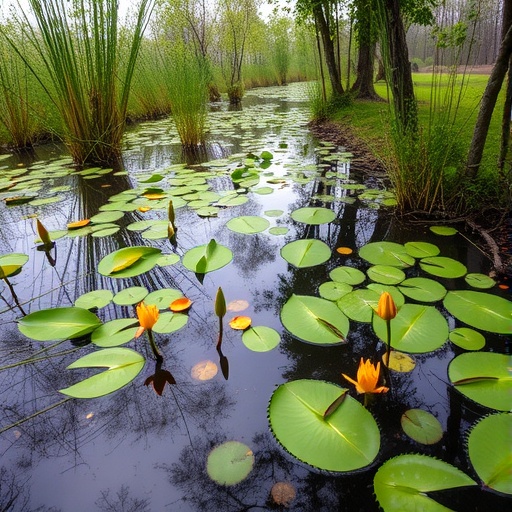In a compelling study examining the intersection of agricultural practices and environmental integrity, researchers focused on the detrimental impacts of pesticide exposure on aquatic ecosystems within a protected area in western Mexico. This important investigation sheds light on how chemical pollutants threaten biodiversity and ecosystem quality, with implications that extend far beyond regional boundaries. The findings highlight the urgent need for effective management strategies to safeguard these fragile ecosystems from the toxic fallout associated with modern agricultural efforts.
The study, led by a team of dedicated scientists, reveals alarming evidence concerning pesticide risk factors in aquatic habitats. The research team meticulously analyzed data drawn from multiple water bodies within the natural protected area, ensuring a comprehensive understanding of the factors contributing to the decreased quality of aquatic ecosystems. This part of Mexico, renowned for its ecological richness, is increasingly endangered by agricultural run-offs that introduce harmful chemicals into the surrounding water systems.
Pesticides, while instrumental for enhancing crop yield, can have unintended consequences for the environment. Using sophisticated analytical techniques, the researchers quantified the concentration levels of various pesticides in aquatic environments. Their results indicate a significant correlation between pesticide presence and declines in both water quality and aquatic life. The implications of these findings transcend the local ecosystem, raising concerns about the broader environmental consequences as these chemicals may bioaccumulate and affect food chains that extend beyond the immediate area.
One of the captivating facets of the research is the examination of specific pesticide classes and their toxicological effects on aquatic organisms. The study delves into how certain chemicals disrupt biological processes, leading to mortality and decreased reproductive success among fish and other aquatic species. This ecological analysis underlines the intricate relationships within ecosystems, where the introduction of pesticides can unravel the delicate balance maintained among species and their habitats.
In addition to assessing chemical concentrations, the researchers evaluated the diversity of aquatic flora and fauna within the affected areas. Alarmingly, their findings revealed a decline in biodiversity linked to pesticide exposure, suggesting that the smallest organisms, often the foundation of aquatic ecosystems, are disproportionately impacted. This loss of biodiversity could have cascading effects, destabilizing entire ecosystems and reducing their resilience to environmental changes.
Furthermore, the researchers recognized the compounding issues associated with pesticide application practices in agriculture. They noted that improper usage, including over-application and inadequate timing, exacerbates the contamination of local water bodies. This research serves as a clarion call for enhanced agricultural practices that prioritize environmental stewardship alongside productivity. Educating farmers about sustainable practices is paramount in safeguarding natural resources while ensuring food security.
As climate change continues to exacerbate the challenges faced by aquatic ecosystems, the study’s findings become all the more relevant. Alterations in rainfall patterns and temperature shifts can amplify the effects of pesticide runoff, creating a perfect storm for aquatic habitats already under threat. Consequently, the research emphasizes the importance of integrating climate considerations into agricultural management, ensuring that strategies are resilient to changing environmental conditions.
In light of these findings, the research team advocates for multi-faceted approaches to tackle the issues at hand. Policymakers are urged to develop stringent guidelines governing pesticide applications, incorporating regular monitoring of water quality and ecosystem health. By establishing buffer zones around water bodies and promoting organic farming techniques, it is possible to mitigate pesticide runoff while also supporting farmers in their transition toward more sustainable practices.
Public awareness and engagement are also crucial components of addressing the risks posed by pesticides. The research underscores the role of citizen scientists in environmental monitoring, promoting community involvement in tracking water quality and documenting biodiversity. By fostering a collective responsibility toward environmental protection, communities can better advocate for policies that prioritize ecological health.
To enhance the study’s impact, the authors suggest further research exploring the long-term consequences of pesticide exposure on different aquatic species. Investigating how pollution affects higher trophic levels, including predatory fish and birds, is vital for understanding the full ecological impact of agricultural chemicals. This understanding can guide future conservation strategies and intervention measures aimed at restoring and preserving aquatic ecosystems.
The insights gained from this groundbreaking research are crucial as the world grapples with the dual challenges of food production and environmental conservation. By recognizing the interconnectedness of agricultural practices and ecosystem health, society can work towards solutions that anchor agricultural success while safeguarding the natural world. With collaborative efforts across sectors and disciplines, it is possible to foster a sustainable future that honors both our need for food and our responsibility to the environment.
In conclusion, the contribution of this study is significant, underscoring the pressing need for proactive approaches to mitigate the risks posed by pesticides to aquatic ecosystems. The researchers call for an interdisciplinary effort that brings together scientists, policymakers, and farmers to address these challenges. Only through concerted action can we hope to preserve the integrity of our aquatic environments and ensure a harmonious coexistence between agriculture and nature. As awareness of these critical issues grows, the hope is that ecosystem-based practices will take center stage, leading to healthier environments and more sustainable agricultural practices for the generations to come.
Subject of Research: The impact of pesticide exposure on aquatic ecosystems in a protected area of western Mexico.
Article Title: Risk in the quality of aquatic ecosystems exposed to pesticides in a natural protected area of influence in western Mexico.
Article References:
Ángel, CE., Manuel, MR.L., Elena, SP.M. et al. Risk in the quality of aquatic ecosystems exposed to pesticides in a natural protected area of influence in western Mexico.
Environ Monit Assess 197, 1306 (2025). https://doi.org/10.1007/s10661-025-14733-9
Image Credits: AI Generated
DOI: https://doi.org/10.1007/s10661-025-14733-9
Keywords: Aquatic ecosystems, pesticides, biodiversity, environmental risk, agricultural practices, water quality, ecological health.




